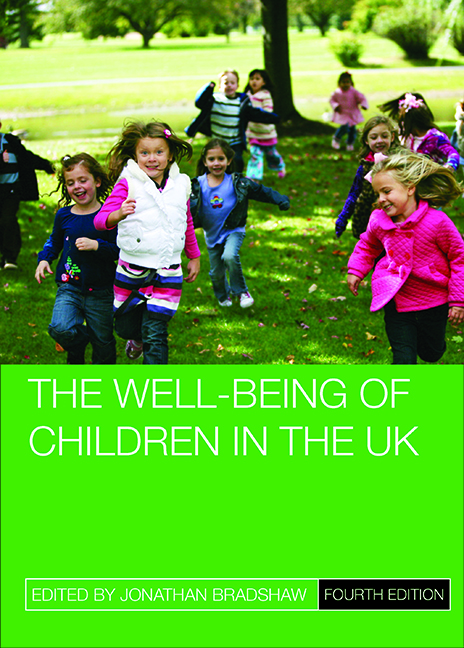Book contents
- Frontmatter
- Contents
- List of figures and tables
- List of abbreviations
- Notes on contributors
- Acknowledgements
- One Introduction
- Two Demography of childhood
- Three Child poverty and deprivation
- Four Physical health
- Five Subjective well-being and mental health
- Six Education
- Seven Housing and the environment for children
- Eight Children’s time and space
- Nine Children and young people in care and leaving care
- Ten Child maltreatment
- Eleven Childcare and early years
- Twelve Children, crime and correction
- Thirteen Conclusion
- Bibliography
- Index
Eleven - Childcare and early years
Published online by Cambridge University Press: 01 September 2022
- Frontmatter
- Contents
- List of figures and tables
- List of abbreviations
- Notes on contributors
- Acknowledgements
- One Introduction
- Two Demography of childhood
- Three Child poverty and deprivation
- Four Physical health
- Five Subjective well-being and mental health
- Six Education
- Seven Housing and the environment for children
- Eight Children’s time and space
- Nine Children and young people in care and leaving care
- Ten Child maltreatment
- Eleven Childcare and early years
- Twelve Children, crime and correction
- Thirteen Conclusion
- Bibliography
- Index
Summary
Key findings
• It is normal for three- and four-year-olds to attend some formal free early education provision.
• Family and child characteristics are the most important factors affecting child outcomes.
• Parenting skills and the ‘home learning environment’ are becoming increasingly important aspects of the evidence base.
• Targeted ‘early interventions’ in the ‘early years of childhood’ are on the increase – especially for the most disadvantaged children.
• There is a drive towards ‘early intervention’ in the early years of childhood that encompasses much more than childcare and early education provision.
Key trends
• Provision of childcare places is insufficient to meet the demands of working parents, whereas part-time early education for three- and fouryear- olds is taken up nearly universally.
• The proportion of children attending different types of early education provider has been relatively stable over the last five years. Between 35% and 38% of three- and four-year-olds attended the private or voluntary sector, and around 55% attended the publicly maintained sector.
• The proportion of disadvantaged two-year-olds attending early education is on the increase, with England leading the way.
• The variety in the nature of provision and the differential ages at which children officially start school make comparisons of international trends very complex. It is not clear how investments in the UK compare to other countries.
Key sources
• Effective Provision of Pre-School Education (EPPE) (England, Wales and Northern Ireland) and Effective Pre-School, Primary and Secondary Education (EPPSE)
• OECD Study for Early Education and Development (SEED)
• ‘An evaluation of a better start’
• Early Intervention Foundation (EIF)
Introduction
Since the last edition, policy-makers have become firmly convinced by the evidence that intervening in early childhood is a very good thing. The policy rhetoric is all about ensuring young children (aged 0-5) in the different countries of the UK have the ‘best start in life’, or a ‘flying start’ or a ‘bright start’ in life. Whether a best, flying or bright start, policies on childcare and early education across the UK continue to follow the twin aims of supporting parental employment and improving child development outcomes. These aims, however, can sit in contention and are often not disaggregated in political rhetoric, or in the discussions of research evidence, or in the design of new policy approaches.
- Type
- Chapter
- Information
- The well-being of children in the UK (4th edition) , pp. 287 - 308Publisher: Bristol University PressPrint publication year: 2011



